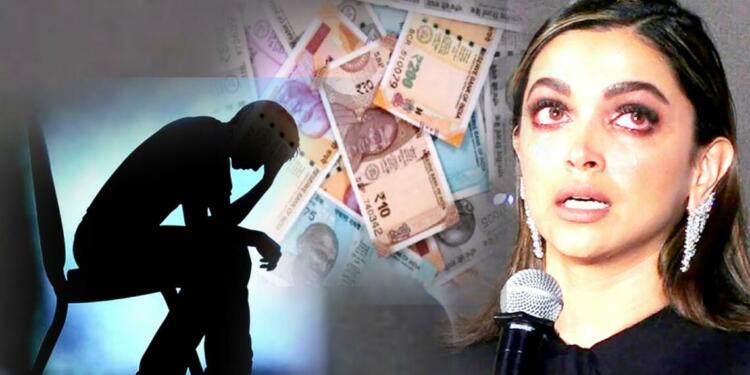Mental health is one term which defines the evolution of society in the 21st century. Once it was considered abnormal to talk about issues plaguing and eventually corroding the human mind. Things have changed for good now and now people are more open about it.
Naturally, the market has also followed its millennium-old habit of chasing people’s choices. No wonder, there is a separate economy for the most delicate aspect of human nature. Knowingly or unknowingly, celebrities like Deepika Padukone have become brand ambassadors of the ever-growing mental health market.
Deepika Padukone on depression
Recently, Deepika Padukone was in Tamil Nadu. She was there to present her views on the mental health epidemic. Her mental health foundation LiveLoveLaugh (LLL) is working actively towards making people aware of the epidemic in rural parts of India. She chose Tamil Nadu because it is one of the hotspots of suicide in India. In 2021, 18,925 suicides had been reported from DMK-ruled state, placing it in the second position in the ranking.
The Actress seems to be of the opinion that the rapid rate of suicides is due to the fact that people are emotionally alone. Deepika cited her own example to highlight the family’s role in the upliftment of someone’s mental health.
Highlighting the role of caregiver, Prakash Padukone’s daughter said, “It is extremely crucial. Even in my personal journey, the role of the caregiver has been extremely important that’s why my mother is here, that’s why my sister has been so passionately part of this cause for many years and also therefore when I hear the stories of the caregivers, I understand how equally important that is as well, and the emotional well-being of the caregiver is as important as the emotional well-being of the person experiencing mental illness.”
A lot of celebrities have come out
Deepika first revealed her struggle with mental health in 2015. But she is not the only one who has been successful in coming out of this torturous journey. Celebrities like Priyanka Chopra, Manisha Koirala, Yo Yo Honey Singh, Anushka Sharma, Varun Dhawan, and Randeep Hooda among others have also been brave enough to expose their vulnerable sides to the world. In Hollywood, Kendall Jenner, Rey Reynolds, Selena Gomez, and Tom Cruise have worked extensively towards raising awareness about the issue.
The decades-long initiatives by celebrities have their share of successes as well. For the last 2 to 3 decades, people have become more accepting of taking on the burden of existence. A lot of them have voluntarily taken on the responsibility of curing their mental health and have been successful to various extents. In India, the war against mental health is still in its nascent stage, but initial trends around awareness are quite encouraging.
India’s progress in mental health
For instance, the Indian Psychiatric Society recommended a draft bill in 1950. It took the advent of the Internet to change it into an act in 2017. Similarly, budget allocation to mental health issues has also witnessed an astronomical increase.
While, till 2017, only 0.05 per cent of health budgets were reserved for mental health, the percentage increased to 0.81 in the budget presented by FM Sitharaman earlier this year. Remarkably, it is still 60 per cent lower than the Global average of 2 per cent.
Though India’s budget allocation is not at par with the developed world, it has spread some positive sentiments in the market. Now, the companies working in the sector have started to believe that their spending on Research and Development would not go to waste.
Loads of startups are also taking the risk. Between 2016 to 2020, Companies poured 1.5 billion Rupees into Indian mental health startups. But, 2021 turned out to be a remarkable year for awareness about mental health.
Awareness is still a concern
Vagaries of unemployment and too much emphasis on work-from-home culture after Covid started to subside took a heavy toll on the mental health of Indians. According to a report by the Times of India, anxiety, depression and panic attacks became more frequent during lockdowns. People reporting anxiety disorders increased from 11 per cent in Jan-June 2019 to 41.1 per cent in January 2021.
The problem was exacerbated by people unaware of anxiety disorders. Statista reported that only 27 per cent of Indians were aware of anxiety disorders, even after Covid. It means that they were feeling irritated but did not even know its cause.
No wonder, in 2021, Indian mental health startups witnessed a sudden spike in their funding. They attracted 0.8 billion Indian rupees. The number is more than half of the investments which mental health startups grabbed between 2016 and 2020.
Judging the initiatives on merits
But all these developments give birth to a few questions as well. These questions are mainly related to their viability in the Indian context. A proper cost-benefit analysis is definitely needed before copy-pasting the American model of psychiatry on 1.4 billion Indians.
It is entirely possible that our problem, though the same in its manifestation in the real world, may have different roots. To be on the safe side, it is worthwhile to check their impact in the western world, the place from which the concept originally came.
Normally, there are two kinds of solutions proposed by western models of treating mental health disorders. The first one is that of therapy and the second one is that of treating them with medicines. In therapy, they encourage you to talk about the problems plaguing your mind.
Constant talking over days, weeks, months and years in a few cases helps decode the therapist the route of the problem. From there on, the therapist is supposed to advise the patient about changing his/her lifestyle. If these changes do not work, then the patient is advised to take medicines.
Demystifying therapy sessions
Out of these two, therapy is considered easier and more convenient for people. Primarily the reason behind this is the fact that you can choose any friend, family member or any other individual whom you can blindly trust. You just have to talk, and the person is just supposed to give an alert ear to you. But, the counter-evidence against this form of treatment is also there. The problem gets more complicated when these counter pieces of evidence come from credible scientists.
A few years back, the American Psychological Association (APA) had come up with guidelines regarding the mental health of men and boys. It had attacked traditional masculine virtues of staying firm and unmoved in troubling situations and had blamed this trait for increasing mental health.
In other words, APA guidelines had claimed that repressing emotions is bad and expressing emotions is good. On the face of it, the assertion looked more like a commercial for business-minded theorists. There was no justification given behind the assertion. Naturally, the scientific community castigated it.
Steven Pinker, a Canadian-American cognitive psychologist, psycholinguist and advocate of evolutionary psychology informed people that the guidelines are nothing but anti-scientific nonsense.
Terming it a folk theory, Pinker said, “It is contradicted by a large literature showing that people with greater self-control, particularly those who repress anger rather than “venting,” lead healthier lives: they get better grades, have fewer eating disorders, drink less, have fewer psychosomatic aches and pains, are less depressed, anxious, phobic, and paranoid, have higher self-esteem, are more conscientious, have better relationships with their families, have more stable friendships, are less likely to have sex they regretted, are less likely to imagine themselves cheating in a monogamous relationship.”
It turned out that Pinker described the whole premise of therapy sessions in one statement. But, these sessions should not be villainised just because they are overused. Pinker said that repressing emotions is good in the majority of cases. Venting out does work for some people which is why therapy sessions are important for them. The problem with these sessions is that people start to treat them as a source of temporary dopamine hit and not as a base on which they could rebuild their lives.
Problems with antidepressants
Incidentally (not coincidentally), this is the same problem with medicines being prescribed for mental health patients. Patients have generally prescribed medicines like Selective Serotonin Reuptake Inhibitors (SSRIs), Adderall, and Ritalin among others. The premise behind antidepressant drugs is simple. For decades, we have been told that scientists have developed a consensus around the reasons for depression.
According to a theory prevalent in medical journals, depressed people have an imbalance of Serotonin. It is Serotonin which defines our mood. It is Serotonin which tells us how to react in a particular situation. If its level is up, a human will take a decision that will make him happy in long term.
On the other hand, if its level is down, he or she will end up taking momentarily impulse-based decisions, which are disastrous for them in the long term. Its imbalance was thought to be an enabler of depression. Resultantly, the prescription of medicines curing it touched astronomical numbers in the Western world.
The premise of antidepressants is wrong
In America, the beacon of mental health awareness, 27 years of timespan between 1991 and 2018 saw a 3,000 per cent increase in the prescription of antidepressant drugs. Ideally, it should have resulted in the prevention of suicides. But, no, the suicide rate increased by 35 per cent. The numbers indicate that there is clearly something wrong with the process of prescription. Turns out, the process was wrong right from its inception.
New scientific metadata has come out revealing that an imbalance in Serotonin is not the reason behind depression. The finding by University College London was published in the much famous Nature magazine as well. Joanna Moncrieff, the lead author of the study said, “It is always difficult to prove a negative, but I think we can safely say that after a vast amount of research conducted over several decades, there is no convincing evidence that depression is caused by serotonin abnormalities, particularly by lower levels or reduced activity of serotonin”
Addictivity of drugs is a problem
Joanna also pointed out that this theory is a major reason behind people taking antidepressant drugs. To substantiate her assertion, she informed that 2 per cent of teenagers are prescribed antidepressants in England. It is becoming an epidemic in the western world.
These drugs, no matter how legal they are, give instant happiness to people. This problem was highlighted by Tom Cruise in 2005. He had observed that these drugs only mask the problems and do not bring life-altering change in a positive way. Tom was also aggrieved by the fact that children were using these drugs rampantly.
At that time, Tom Cruise had newly become a father and had done extensive study of antidepressants and their impact on mental health. He termed them mind-altering and antipsychotic drugs. Tom had advocated for a change in lifestyle through better eating and exercising habits to cure the problem, rather than relying on anti-depressants.
Better to change yourself rather than rely on drugs
This aspect of treatment has been highlighted by various other celebrities as well. Even Priyanka Chopra also cited her ‘sense of purpose’ as a reason behind her maintaining sanity during covid times. More recently, our World Cup-winning Captain Kapil Dev also cheekily termed depression as an outcome of not being 100 per cent present in the moment. He emphasised enjoying every moment as a cure for what Dev himself termed the “American term” (Depression).
Well, you can’t remain 100 per cent present until you have convinced yourself about the authenticity of your goal. Only when both conscious and subconscious are sure about the pathway, do both not collide. The first step towards avoiding this collision is earmarking a long-term plan and using each passing day as a ladder to climb to the goal set in our long-term plans.
This saves brains from being attacked with uncertainties since the philosophical foundations of daily lives get solidified. At the end of the day, it is only philosophical foundations which decide the life track. Psychiatry is just a medicinal branch of Philosophy.
Support TFI:
Support us to strengthen the ‘Right’ ideology of cultural nationalism by purchasing the best quality garments from TFI-STORE.COM




























